Unlocking Career Success: The Significance of PMP Certification

In today's competitive job market, professionals in project management are continuously seeking ways to stand out from the crowd and advance their careers. Among the myriad of certifications available, one stands tall as a beacon of excellence and proficiency: the Project Management Professional (PMP) certification. Widely recognized and respected globally, PMP certification holds immense importance in enhancing career prospects and opening doors to lucrative opportunities in the field of project management.
Understanding PMP Certification
Administered by the Project Management Institute (PMI), PMP Certification validates an individual's proficiency in project management principles, practices, and methodologies. It signifies a comprehensive understanding of project management processes, tools, and techniques, as well as a commitment to adhering to the highest standards of professionalism and ethics in managing projects.
To obtain PMP certification, candidates must fulfill rigorous eligibility criteria, including a minimum of 4,500 hours of project management experience and 35 hours of formal project management education. Additionally, candidates must pass a challenging exam comprising 200 multiple-choice questions that assess various aspects of project management knowledge, such as initiating, planning, executing, monitoring and controlling, and closing projects.
Enhancing Career Prospects
-
Global Recognition: PMP certification is recognized and respected worldwide, making certified professionals highly sought after by organizations across industries. Whether you're working in IT, construction, healthcare, finance, or any other sector, PMP certification demonstrates your competence and commitment to excellence in project management, making you a valuable asset to employers.
-
Career Advancement: PMP certification opens doors to higher-level job opportunities and career advancement. According to PMI's Project Management Salary Survey, PMP-certified professionals earn significantly higher salaries on average than their non-certified counterparts. Moreover, certified project managers are more likely to be considered for leadership roles, such as project manager, program manager, or portfolio manager, where they can lead larger and more complex projects, teams, and initiatives.
-
Increased Marketability: In today's competitive job market, having PMP certification sets you apart from other candidates vying for the same positions. Employers often prioritize PMP-certified professionals due to their proven ability to deliver successful projects on time, within budget, and according to scope. PMP certification serves as a powerful differentiator on your resume, demonstrating your credibility, competence, and dedication to professional development.
-
Expanded Network: Becoming PMP-certified also provides opportunities to network with other professionals in the project management community. PMI chapters and local project management groups offer networking events, workshops, and seminars where certified professionals can connect, share knowledge, and learn from each other's experiences. Building a strong professional network can lead to valuable career connections, mentorship opportunities, and potential job referrals.
-
Continuous Learning and Growth: Maintaining PMP certification requires ongoing professional development through earning professional development units (PDUs) by participating in relevant training, webinars, conferences, and other learning activities. This commitment to continuous learning ensures that PMP-certified professionals stay abreast of the latest trends, best practices, and emerging technologies in project management, enhancing their skills and expertise over time.
Conclusion
In conclusion, PMP certification is not just a credential; it's a gateway to unlocking career success and achieving professional excellence in project management. By obtaining PMP certification, professionals demonstrate their competence, credibility, and commitment to delivering successful projects that drive organizational success. From increased job opportunities and higher salaries to enhanced marketability and continuous learning, PMP certification offers a multitude of benefits that can propel your career to new heights. So, if you're aspiring to advance your career in project management, investing in PMP certification is undoubtedly a wise decision that can yield substantial returns in the long run.
- Questions and Answers
- Opinion
- Story/Motivational/Inspiring
- Technology
- Art
- Causes
- Crafts
- Dance
- Drinks
- Film/Movie
- Fitness
- Food
- Games
- Gardening
- Health
- Home
- Literature
- Music
- Networking
- Other
- Party
- Religion
- Shopping
- Sports
- Theater
- Wellness
- News
- Culture
- War machines and policy

